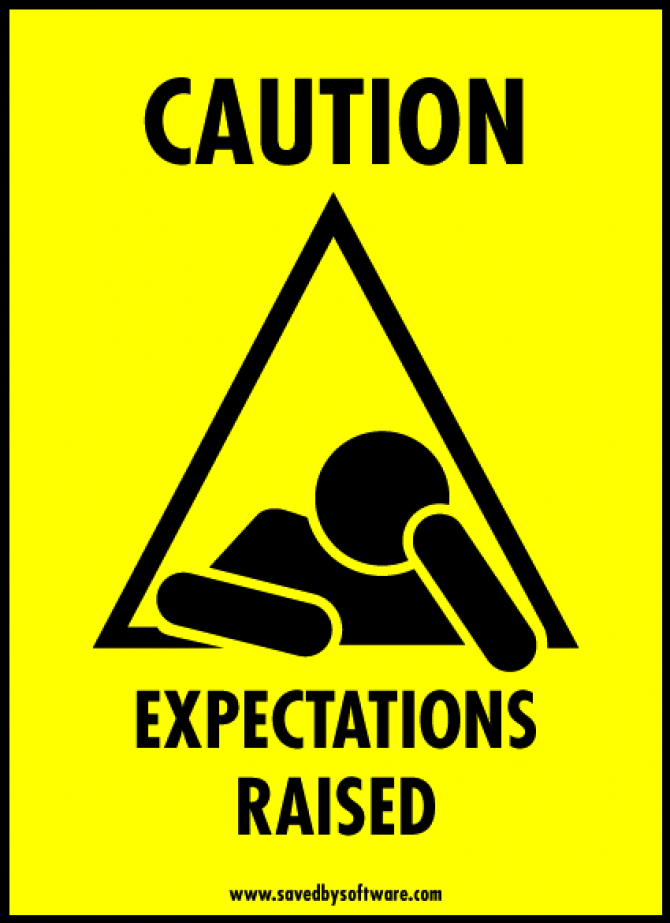Leadership Lessons my Kids Taught Me #2: Diapers Only Go To Size 6
My wife and I went to Costco the other day to buy diapers for our 8-month-old daughter. I’m constantly astounded at the variety of baby products available; it’s a little overwhelming. And diapers are no exception.
There are “Little Snugglers”, “Little Movers” and “Snug & Dry” (I always wonder—if I don’t buy the “Snug & Dry” is there no guarantee that she will remain snug and/or dry?). There’s the leak lock system, or the snug fit system. There are overnites, little swimmers, pull-ups, jean diapers (replete with a denim print) and even a new “green” option—made with hypoallergenic, organic cotton and with a liner made of renewable materials!
And that’s just a single brand!
My wife is far more decisive than I, and she quickly made her decision (we didn’t choose the “green” option), and moved to deciding which size was appropriate for our daughter.
“The size 2,” my wife said, “is for 12-18 pounds; that’s what she has now, though, and they seem a little tight.”
“So let’s go with the size 3, then,” I said. “They’re good from 16-28 pounds. She’s 17 pounds now, and if we buy the 2’s, we might not get through the whole box before she outgrows them.”
“But there are a lot more diapers in the size 2 box,” she says, “than the size 3 box—and for the same amount of money.” That’s the difficult thing about Costco: the size 2 box had approximately 3,100 diapers in it whereas the size 3 box only had approximately 2,700 (I might be a little off on those numbers, but you get my point).
We ultimately settled on the box of size 3 diapers, but as we debated, I scanned the area to see what the size range is for diapers. It appears that you can buy diapers up to a size 6 (which is suitable for children “over 35 lbs” according to the box).
Something occurred to me and later that night I asked my eight year-old son if it would bother him if I made him wear diapers. He gave me a very strange look. “I’m not going to force you to wear them,” I told him, “I’m just curious. What would you think?”
“That would be weird, Dad,” he said, “and embarrassing at school. I don’t need diapers!” He was a little embarrassed, so I let the topic go, but it seemed that there was an analogy there. You don’t have to be a parent to recognize that there’s a general expectation that, at some point, diapers aren’t going to be a necessity any longer. Forget the diapers, though; from a general developmental standpoint, we (as parents) recognize that our job is to ensure that our children develop the skills, talents, knowledge and expertise required to ensure that next year they aren’t facing the same limitations that they are this year.
What I mean by that is, as a parent, your life is one long chain of constantly changing developmental goals for your children. First, your goal is to get them to smile or coo when you speak unintelligible baby talk to them. And when they finally do, you begin to teach them to say “DaDa” or “MaMa”. And then it’s to wave bye-bye or blow kisses, and to crawl, then to walk. Then it’s to count to ten, recognize their colors, or to recognize and say “nose” when you point to your nose.
Soon you’ve moved on to reading and writing, tying their shoes and riding a two-wheeled bicycle. Then it’s on to addition and subtraction, multiplication and division, playing the piano (or violin or the flute—or even golf).
And one measure of our success as parents is the degree to which we aren’t still working on those early things—the degree to which our children have mastered something, and moved on to the next logical area of mastery. We recognize, more than anything, the job of a parent is not a static job; it changes based upon the development of our children, and perception of our success is a direct reflection of the degree to which our children no longer need us to help them in those early areas of development.
Contrast that with the general role of a manager in a traditional organization. I don’t bring this up to disparage managers, and I certainly am not making any generalizations about managers. But there is something to be said here for the underlying system.
Think about this: great managers aside, the system in which managers work doesn’t say much for the manager’s subordinates. The system puts in place pretty rigid methods of oversight—methods that don’t, systematically, allow much room for the development of those being overseen. As an example, it’s generally recognized that one role of a manager is to approve purchases. There’s a rational reason for this; leaders in companies want to make sure their resources are being used appropriately (that is, that money isn’t being wasted) and, perhaps more importantly, that the purchase fits into the strategy or mission of the enterprise. And, on my first day working in a factory (or hardware store or appliance store), that system makes a lot of sense. It’s unlikely I have enough perspective or expertise to be very effective at making wise purchases that support my organization’s mission past basic office supplies. And that’s probably true of me on day three, and on day 10, and perhaps even on day 30. But sooner or later, that’s not going to be the case any longer. I’m going to learn the organization and our business; I’m going to implicitly understand our mission, and what’s required to achieve our mission. Further, I’m going to develop ideas and concepts that I believe would support us more effectively achieving that mission.
In fact, for all intents and purposes, my level of knowledge, insight and expertise is going to rival that of my manager. But the system doesn’t account for that, does it? Sure, my manager (if she’s a good manager) might recognize this, and might allow me more latitude (thereby bending—or breaching—the policies, but to a positive end). But she might not. The point is that the system itself isn’t designed to assume that employees develop and grow—and that the managerial systems (like purchasing oversight) necessary on day one aren’t likely to be necessary as employees develop.
And what invariably ends up happening is employees end up frustrated, disenchanted and disengaged—just like my 8-year-old son would have been had I forced him to start wearing diapers. And, even if you aren’t interested in engagement or disenchantment, think about this: if the system itself is structured so that my manager is required to approve purchases, even when it’s apparent that I have at least as much expertise as she does, and am equally as committed to the mission as she, aren’t we wasting human effort? And that’s one small example; when we consider the compounded effect of a system that demands this type of relationship all the way up and down the chain of command, the potential costs are staggering.
I know that I’m presenting hypotheticals and concepts that are a little theoretical here, and I can hear you, my Eternal Reader, telling me that you were “a good manager”, and that most of the managers that you encountered were also good managers—and that may, in fact, be true. But my quest here isn’t against “bad managers”; it’s against a system that is inherently flawed. Sure, we can make the flawed system better by hiring good managers, but that doesn’t seem like a very noble quest—and it’s certainly not the stuff revolutions are made of.
This is, as always, first and foremost a call to examine the very philosophies that underlie our organizations. There are inherent flaws in the system as we know it—flaws that can’t be addressed by simply hiring better managers. Kids grow up, and our role as a parent changes. And employees grow; we can’t grow as a company with a managerial system that assumes they don’t.
– Originally published by The Self-Management Institute on July 20, 2011.





